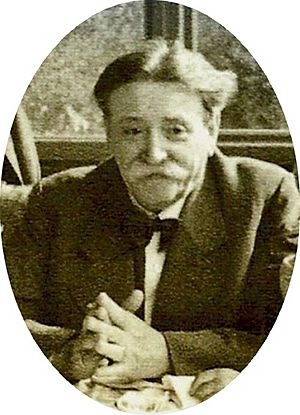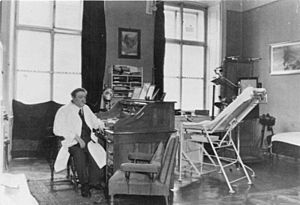Eduard Bloch facts for kids
Quick facts for kids
Eduard Bloch
|
|
|---|---|

Bloch in 1926
|
|
| Born | 30 January 1872 Frauenberg, Austria-Hungary
|
| Died | 1 June 1945 (aged 73) New York City, New York, U.S.
|
| Resting place | Beth David Cemetery |
| Education | Charles University |
| Occupation | Physician |
| Known for | Childhood doctor to Adolf Hitler |
Eduard Bloch (born January 30, 1872 – died June 1, 1945) was an Austrian doctor. He worked in Linz, Austria. For many years until 1907, he was the family doctor for Adolf Hitler and his family.
When Hitler's mother, Klara, was very sick with breast cancer, Dr. Bloch often charged the family less money. Sometimes, he didn't charge them at all. Later, when the Nazis took over Austria in 1938, Hitler gave Dr. Bloch special protection. Hitler personally made sure he was safe, even though Bloch was an Austrian Jew. After a terrible event called Kristallnacht and growing hatred against Jewish people in Germany, Hitler allowed Dr. Bloch to move to the United States. Dr. Bloch lived there until he died in 1945 from stomach cancer.
Contents
Dr. Eduard Bloch's Early Life
Dr. Bloch was born in a place called Frauenberg. Today, this area is part of the Czech Republic. He studied medicine in Prague at Charles University. After finishing his studies, he worked as a doctor in the Austrian army.
He was stationed in Linz from 1899 until 1901. After leaving the army, he opened his own doctor's office in Linz. His office and home were in a beautiful old building at 12 Landstrasse. He lived there with his wife, Emilie, and their daughter, Trude, who was born in 1903.
People in Linz thought highly of Dr. Bloch. He was especially respected by poorer people. Everyone knew he was ready to visit patients at any time, even at night. He used to travel in a special horse-drawn carriage called a hansom. He wore a noticeable wide-brimmed hat. Like many Jewish families in Linz at that time, the Blochs were well-integrated into society.
Dr. Bloch and the Hitler Family

Dr. Bloch first treated Adolf Hitler in 1904. At that time, young Adolf was very sick with a lung problem. Because of this illness, he was allowed to stop school and go home.
However, after looking at Hitler's old medical records, Dr. Bloch later said he only treated Adolf for minor sicknesses. These included things like a cold or sore throat. Dr. Bloch stated that Hitler was neither very strong nor very sickly. He also said that Hitler did not have any serious illness, especially not a lung disease.
Caring for Klara Hitler
In 1907, Hitler's mother, Klara Hitler, was diagnosed with breast cancer. She died on December 21 after a lot of pain. Dr. Bloch gave her daily treatments with a strong medicine called iodoform. This medicine was common then but was painful and smelled bad.
Because the Hitler family didn't have much money, Dr. Bloch charged them less. Sometimes, he didn't charge them anything at all. In 1908, Adolf Hitler sent Dr. Bloch a postcard. In it, he thanked the doctor and showed his respect. He also gave Dr. Bloch handmade gifts. One gift was a large wall painting, which was later lost.
Even in 1937, Hitler asked about Dr. Bloch's health. He even called him an Edeljude, which means "noble Jew." Dr. Bloch seemed to have a special fondness for the Hitler family. This connection might have saved his life later on.
Moving to the United States
After Germany took over Austria in March 1938, life became very difficult for Jewish people in Austria. Dr. Bloch's medical office was closed on October 1, 1938. His daughter and son-in-law, Dr. Franz Kren, then moved overseas.
Dr. Bloch, who was 66 years old, wrote a letter to Hitler asking for help. Because of this letter, the Gestapo (the secret police) gave him special protection. He was the only Jewish person in Linz with this special status.
Dr. Bloch and his wife stayed in their home without trouble. This allowed them to finish the paperwork to leave Germany and move to the United States. They were even able to sell their family home for a fair price. This was very unusual at the time. Jewish people who were leaving often had to sell their homes cheaply. Also, the Nazis often took Jewish people's money. The Blochs were allowed to take the equivalent of 16 Reichsmark out of the country. Most Jewish people were only allowed to take 10 Reichsmark.
In 1940, Dr. Bloch moved to the US. He settled in the Bronx, New York City. However, he could no longer work as a doctor. His medical degree from Austria-Hungary was not recognized in the US. He died in 1945 at age 73 from stomach cancer. This was barely a month after Hitler's death. Dr. Bloch is buried in Beth David Cemetery in Elmont, New York.
Interviews and Memories
In 1941 and 1943, Dr. Bloch was interviewed by the Office of Strategic Services. This was an early version of the Central Intelligence Agency (CIA). They wanted to learn more about Hitler's childhood.
Dr. Bloch strongly disagreed with the idea that Hitler's love for his mother was unhealthy. He remembered Hitler being the "saddest man I had ever seen" when he heard his mother was going to die. He described Klara Hitler as a very "pious and kind" woman.
According to Dr. Bloch, after Hitler's father, Alois Hitler, died, the family didn't have much money. He said that Klara Hitler lived very carefully and never spent money on anything extra.
Works About Dr. Bloch
Hedda Wagner, an author who supported women's rights, wrote a book dedicated to Dr. Bloch. The writer Jay Neugeboren set his novel 1940 in the Bronx. This book focuses on events involving Eduard Bloch.
See also
 In Spanish: Eduard Bloch para niños
In Spanish: Eduard Bloch para niños
- Hugo Gutmann
Sources
- Eduard Bloch: "My Patient Hitler". In: Collier’s Weekly, March 15 and March 22, 1941.
- Eduard Bloch: The Autobiography of Obermedizinalrat Eduard Bloch. In: J. A. S. Grenville and Raphael Gross (Eds.): The Leo Baeck Institute Year Book, XLVII (2002)
- Office of Strategic Services, Hitler Source Book, Interview With Dr. Eduard Bloch March 5, 1943
- Hamann, Brigitte Hitler's Vienna: A Dictator's Apprenticeship. Oxford University Press, 1999. ISBN: 0-19-514053-2
 | James Van Der Zee |
 | Alma Thomas |
 | Ellis Wilson |
 | Margaret Taylor-Burroughs |

